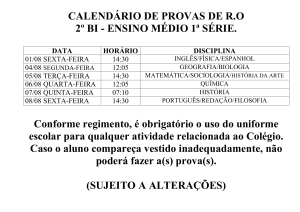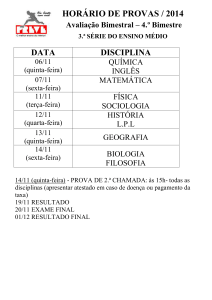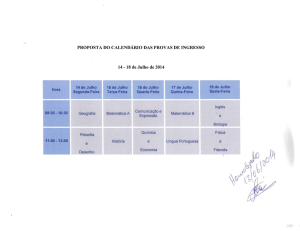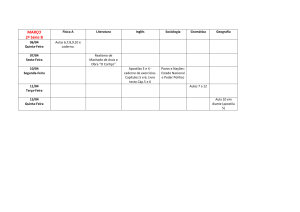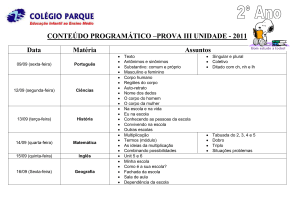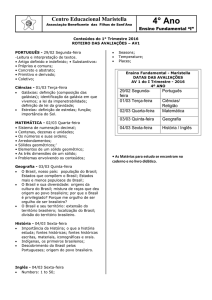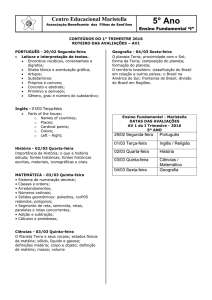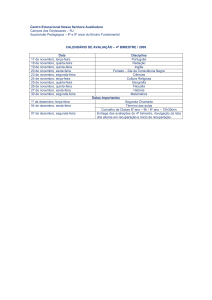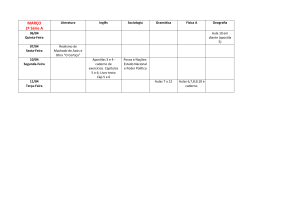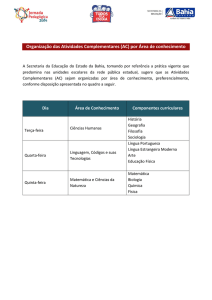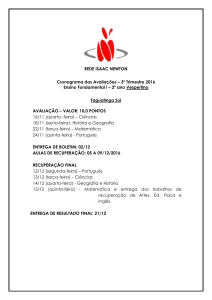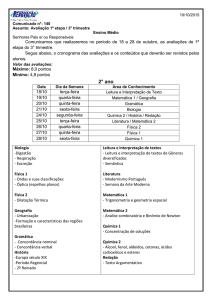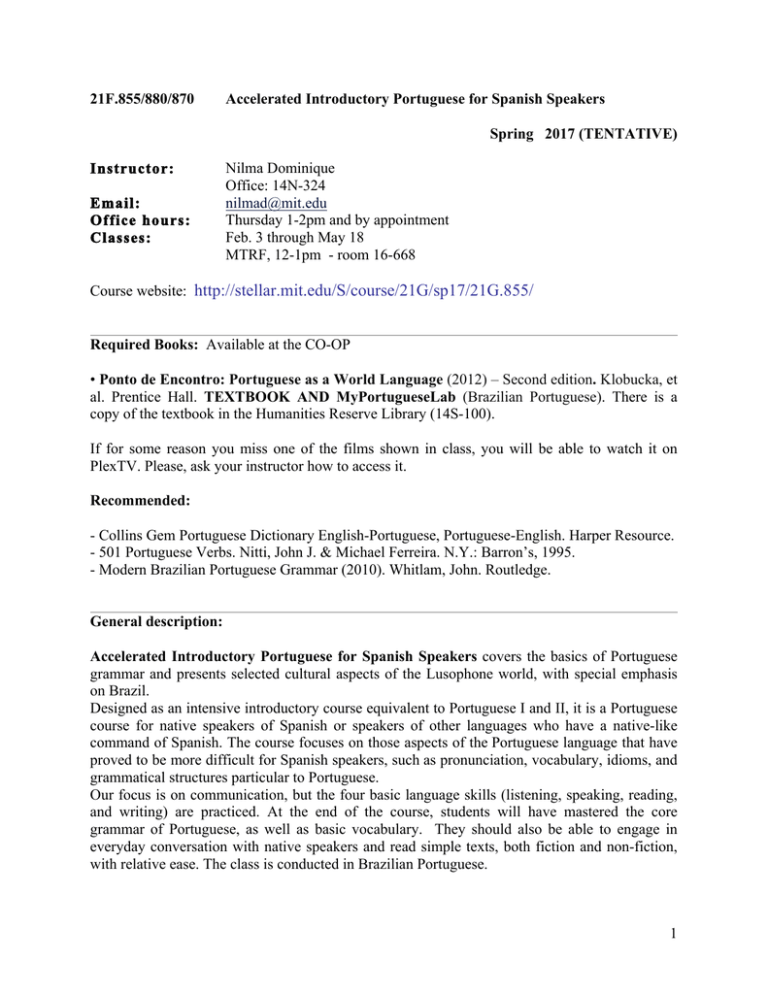
21F.855/880/870
Accelerated Introductory Portuguese for Spanish Speakers
Spring 2017 (TENTATIVE)
Instructor:
Email:
Office hours:
Classes:
Nilma Dominique
Office: 14N-324
[email protected]
Thursday 1-2pm and by appointment
Feb. 3 through May 18
MTRF, 12-1pm - room 16-668
Course website: http://stellar.mit.edu/S/course/21G/sp17/21G.855/
Required Books: Available at the CO-OP
• Ponto de Encontro: Portuguese as a World Language (2012) – Second edition. Klobucka, et
al. Prentice Hall. TEXTBOOK AND MyPortugueseLab (Brazilian Portuguese). There is a
copy of the textbook in the Humanities Reserve Library (14S-100).
If for some reason you miss one of the films shown in class, you will be able to watch it on
PlexTV. Please, ask your instructor how to access it.
Recommended:
- Collins Gem Portuguese Dictionary English-Portuguese, Portuguese-English. Harper Resource.
- 501 Portuguese Verbs. Nitti, John J. & Michael Ferreira. N.Y.: Barron’s, 1995.
- Modern Brazilian Portuguese Grammar (2010). Whitlam, John. Routledge.
General description:
Accelerated Introductory Portuguese for Spanish Speakers covers the basics of Portuguese
grammar and presents selected cultural aspects of the Lusophone world, with special emphasis
on Brazil.
Designed as an intensive introductory course equivalent to Portuguese I and II, it is a Portuguese
course for native speakers of Spanish or speakers of other languages who have a native-like
command of Spanish. The course focuses on those aspects of the Portuguese language that have
proved to be more difficult for Spanish speakers, such as pronunciation, vocabulary, idioms, and
grammatical structures particular to Portuguese.
Our focus is on communication, but the four basic language skills (listening, speaking, reading,
and writing) are practiced. At the end of the course, students will have mastered the core
grammar of Portuguese, as well as basic vocabulary. They should also be able to engage in
everyday conversation with native speakers and read simple texts, both fiction and non-fiction,
with relative ease. The class is conducted in Brazilian Portuguese.
1
21F.870 - In conjunction with 21F.076J, the course covers the same material as 21F.880.
However, students who take the Globalization course version must submit only two
compositions, instead of the regular four compositions.
Limited to 18 for pedagogical purposes. Level I-II – Preference is given to pre-registered
students. Continuing students get first priority, followed, in order, by declared concentrators,
students in 21F.076, sophomores, juniors freshmen, seniors, grad students, pre-registered
students who did not show up for the first two days of class without warning.
Additional resources, as well as the complete course syllabus, can be found at the Stellar site.
You need an MIT certificate to access it.
Evaluation/grades
Grading is based on frequent relatively small evaluations rather than on one or two major
hurdles.
1. Class attendance, participation and homework: 25%
Your presence and active participation are essential in each and every session. This will be the
most significant part of your grade since it is through continuous class interaction with other
students that your communicative abilities in Portuguese will develop and improve. Your grade
will be determined daily by the quality and quantity of your preparation and participation in class
discussions, activities, group work, etc.
Attendance:
As your progress, and that of the class as a whole, will be impeded by excessive absences, your
presence in the classroom is imperative. If you must miss a class, there is no excuse for not
being prepared for the next one. If you have to be absent, please contact the instructor in advance
to find out what material you will miss. Each absence without an official excuse will lower your
course attendance and participation grade. Any student who has accumulated more than three
absences without an official excuse must see the instructor. Further absences after the warning
will affect your final grade.
Homework and Written Work: Students are expected to prepare the assigned materials for
each class and complete the written work as stipulated in the syllabus. These assignments
include:
·
Studying the vocabulary and grammar in Ponto de encontro and completing any
written exercises assigned.
·
Completing the exercises in the MyPortugueseLab. The solution to most
exercises is provided immediately. Exercises requiring long written answers will be corrected
by the instructor.
·
All assignments are to be done on the date indicated. Late work will not receive
full credit. Anything marked “enviar” is to be SUBMITTED ONLINE. The exercises in
2
MyPortugueseLAb are designed to reinforce the grammar and vocabulary introduced in the
textbook, as well as to improve your listening comprehension. They are required components
of the course and it's important that you complete them right away, as soon as the material is
covered. Don’t let your homework pile up. Working a little every day and frequent reviewing
are more effective than a few long sessions of study at longer intervals.
·
2. Compositions (redações): (20%) Total of four pieces of writing based on the short stories
read in class – available on the course website. They should be at least 150-word long (15 lines),
typed and double-spaced. Compositions should be turned in on the day assigned in the daily
program. Once returned by the teacher, a second version with corrections must be handed in. If
an essay has two pages, they should be stapled.
3. Exams: 4 in-class tests (40%).
4. Oral presentation: (15%) In addition to the written quizzes, students will make a 10-minute
oral presentation in front of the class. Students may talk about a place where Portuguese is
spoken or a historically or culturally significant figure in the Lusophone world. Alternatively,
they can choose to talk about a personal trip. There will also be an individual oral test in the form
of a 10-minute interview (entrevista) with the instructor.
Grading Scale:
A+ (98-100); A (94-97.9) A- (90-93.9); B+ (86-89.9); B (84-85.9); B- (80-83.9); C+ (76- 79.9);
C (74-75.9); C- (70-73.9); D+ (66-69.9); D (63-65.9); F (62 and below).
ACADEMIC INTEGRITY
Academic integrity is defined by the Center of Academic Integrity as “a commitment, even in the
face of adversity, to five fundamental values: honesty, trust, fairness, respect, and responsibility.”
If you haven’t done so yet, please read the MIT Academic Integrity Handbook at
http://integrity.mit.edu.
Learning a foreign language is not something that typically occurs in isolation. Communication
and practice are essential. Therefore, working with others is highly encouraged. However, there
are cases in which collaboration is tantamount to cheating. There follow some examples of what
is allowed and what is not in our class: having your pronunciation corrected by a native speaker
before an oral presentation is perfectly acceptable. They won’t utter the words for you in class.
Using a spellchecker is valid if you are writing a text, but having a text edited by another person
before submission is clearly a different matter. To a certain extent, the editor is the coauthor of
the text. Likewise, the use of dictionaries is recommended, but no translation program may be
used. In a few words, obtaining help from people or online resources is allowed as a way of
enhancing your learning, but should be avoided altogether if as a result of it, the work submitted
is not an accurate representation of the student’s progress or capacity. If that’s the case, it will be
considered academic dishonesty.
If you have doubts about what you can do in this class, consult with your instructor.
CELL PHONE, TEXT MESSAGING AND LAPTOP POLICY
NO CELL PHONES or other electronic communication devices are to be used during class.
3
You may use your laptop in case a class activity requires use of textbook and you have your
textbook online and not a physical copy.
Accelerated Introductory Portuguesese for Spanish Speakers
CALENDÁRIO: programa e exercícios
Spring 2017
·
Always read “Vamos Viajar” and “Horizontes” in the order they appear in each
lesson and be prepared to talk about them.
·
Explore MyPortugueseLab, where you can find videos, audios, flash cards, etc.
It is highly advisable to read “readinesscheck” before each new grammar point.
FEVEREIRO
1
Terça-feira, 7 (LP, pp. 2-9)
Apresentação do curso
Apresentações e saudações
Expressões de cortesia
Expressões úteis na sala de aula (pp. 24-25)
Quinta-feira, 9 (LP, pp. 10)
O alfabeto
Letras e sons: a fonética do português brasileiro
Vogais abertas, fechadas e nasais
LER: (read in MyPortugueseLab) SAM OP Pronúncia: Sílabas tônicas e acentos / As vogais / As
vogais nasais / Os sons do “d” e do “t”.
Sexta-feira, 10 (LP, pp. 11- 14)
Identificação e descrição de pessoas
Cognatos
Verbo “ser” / pronomes pessoais
Vocabulário: a sala de aula
Preposições
Segunda-feira, 13 (LP, pp. 16 - L1, 35)
Números de 0-99
In Portuguese, the days of the week are segunda-feira (Monday), terça-feira (Tuesday),
quarta-feira (Wednesday), quinta-feira (Thursday), sexta-feira (Friday), sábado (Saturday) and
domingo (Sunday).
1
4
Vocabulário: meses do ano e dias da semana
As horas
Vocabulário: a vida dos estudantes
Verbos de primeira conjugação (-AR)
LER: (read in MyPortugueseLab) SAM PS (Appedix 1 – Practice for Speakers of Spanish):
Numbers from 0-99 / As vogais abertas “e” e “o”
Terça-feira, 14 (L1, pp.36-45)
Vocabulário: na universidade
Pronomes sujeito
Vamos viajar: A vida universitária
Artigos e substantivos: gênero e número
Enviar os exercícios da lição preliminar
Quinta-feira, 16 (L1, pp.46-54)
Contração de preposição com artigos
Presente do verbo “estar”
Pronomes interrogativos
Vamos viajar: As universidades
LER: (read in MyPortugueseLab) SAM 01 Pronúncia: Os ditongos orais / o “m” e o “n”
nasalisados ou nasalados / Os ditongos nasais. SAM PS: The verb gostar de / Articles / Os
ditongos nasais
Sexta-feira, 17 (L1, pp.55-67)
Verbos regulares de segunda (-ER) e terceira (-IR) conjugações
Horizontes: São Paulo e Rio de Janeiro
Enviar os exercícios da lição 1
Segunda-feira, 20
PRESIDENTS DAY - FERIADO
Terça-feira, 21 (L2, pp. 68-89)
Adjetivos descritivos
Cores
Diferença entre “ser” e “estar”
Vamos viajar: A diversidade global do mundo lusófono
LER: (read in MyPortugueseLab) SAM PS. Estrututras: Ser e estar / Pronúncia do “b” e do “v”.
5
Quinta-feira, 23 (L2, pp. 90-107)
Pronomes possessivos
Expressões com “ter” e “estar com”
Horizontes: O sudeste e o sul do Brasil
Diversões populares
Sexta-feira, 24
Nacionalidades
Atividade escrita e oral
Segunda-feira, 27 (L3, pp.108-129)
Vocabulário: comida
Mais verbos regulares de segunda (-ER) e terceira (-IR) conjugações
Verbos “ir” e “ter”
Vamos Viajar: O cinema e o teatro
Enviar os exercícios da lição 2
Terça-feira, 28 (L3, pp. 131-149)
Vamos viajar: A música e os concertos
Números acima de 100
Usos de “por” e “para”
Horizontes: O Nordeste do Brasil
LER: (read in MyPortugueseLab) SAM 03 Pronúncia: os sons do “x” / Os sons do “g”. SAM PS:
The verb ir / Os sons do “r” e do “j”
MARÇO
Quinta-feira, 2 (L4, pp. 150-162)
Vocabulário: a família
Verbos com mudança de raíz
Vamos viajar: Laços de família
Enviar os exercícios da lição 3
Sexta-feira, 3 (L4, pp. 163-174)
Advérbios
Presente de verbos irregulares
“Fazer” e “haver” com expressões de tempo
6
Vamos viajar: A família e a sociedade
LER: (read in MyPortugueseLab) SAM PS: Present tense of stem-changing verbs / os sons do
“s” e do “z”.
Segunda-feira, 6
Teste 1: lições preliminar 1, 2 e 3
Terça-feira, 7 (L4, pp. 173 - L5, 196)
Pretérito perfeito
Horizontes: O Norte do Brasil e o Amazonas
Vocabulário: A casa e os móveis
As tarefas domésticas
LER: (read in MyPortugueseLab) SAM 04 Pronúncia: Os sons do “s” e do “z” / Ligação de
palavras (linking) / Ligação de palavras e crase.
Quinta-feira, 9 (L5, pp. 197-211)
Presente progressivo
Vamos viajar: Lugares para morar
“Ter”, “estar com” e “ficar com”
Pronomes adjetivos e demonstrativos
Presente de verbos irregulares
Enviar os exercícios da lição 4
Sexta-feira, 10
Atividade escrita/oral
Segunda-feira, 13 (L5, pp. 212-231)
Vamos viajar: O exterior e o interior das casas
“Saber” e “conhecer”
Verbos e pronomes reflexivos
Horizontes: Brasília e o Centro-oeste
LER: (read in MyPortugueseLab) SAM 05 Pronúncia: O acento: palavras proparoxítonas / Os
sons do “c” e do “ç” / O som do “q”. SAM PS: Demonstrative adjectives and pronouns.
Terça-feira 14 (L6, pp. 232-246)
Vocabulário: roupa e acessórios
7
Pretérito perfeito: verbos regulares e irregulares
Vamos viajar: As compras
Enviar os exercícios da lição 5
Quinta-feira, 16 (L6, pp. 247-265)
Pronomes objeto direto
Vamos viajar: Feiras e mercados
“Tag questions”
“Por” e “para”
Horizontes: Lisboa, a capital de Portugal
LER: (read in MyPortugueseLab) SAM 06 Pronúncia: O acento: palavras paroxítonas / Mais
sobre palavras paroxítonas. SAM PS: Direct object nouns and pronouns / o “f” português e o “h”
espanhol.
Sexta-feira, 17 (L7, pp. 266-283)
Vocabulário: esportes, o tempo e as estações
Pronome objeto indireto
Pretérito perfeito irregular
Enviar os exercícios da lição 6
Segunda-feira, 20 (L7, pp. 284-305)
Vamos viajar: Os clubes esportivos
Pretérito imperfeito
Vamos viajar: A história do futebol
Há/faz (ago)
Horizontes: O Sul de Portugal
LER: (read in MyPortugueseLab) SAM 07 Pronúncia: o acento gráfico: hiato (hiatus) / O acento
grave e a crase. SAM PS: Indirect object nouns and pronouns / As terminações –(ç)ão e –(c)ión.
Terça-feira, 21 (L8, pp. 306-322)
Festas e tradições
Comparativos
Superlativo
Vamos Viajar: Festas populares
Enviar os exercícios da lição 7
Quinta-feira, 23
8
Teste 2: lições 4 – 7
Sexta-feira, 24 (L8, pp. 323 -337)
Pronomes depois de preposições
Verbos reflexivos
Vamos Viajar: As religiões no mundo lusófono
Horizontes: O Centro e o Norte de Portugal
27 – 31 de março: Férias de primavera
ABRIL
Segunda-feira, 3
Crônica 1: “ Posto 5”
Vídeo: O Povo Brasileiro (Parte 1) – Matriz Tupi
LER: (read in MyPortugueseLab) SAM PS: Comparisons of Inequality / Comparisons of
equality.
Terça-feira, 4 (L9, pp. 338- 354)
As profissões
“Se” impessoal
Pretérito perfeito e imperfeito
Vamos Viajar: Os jovens e o trabalho
Enviar os exercícios da lição 8
Quinta-feira, 6
Crônica 2: “Moça do interior”
Vídeo: O Povo Brasileiro (Parte 2) – Matriz Lusa
Sexta-feira, 7 (L9, pp. 355- 373)
Pronomes interrogativos
Imperativo
Vamos Viajar: A união faz a força
Horizontes: Os Açores e a Madeira
Entregar a primeira redação: Com base nos contos “Posto 5” e “Moça do Interior”, escreva
uma redação sobre o relacionamento entre pessoas diferentes. Você acredita que diferenças
culturais, de idade, de raça, de religião, de classe social, de nível educativo, ideológicas, etc.
podem dificultar ou impedir o relacionamento entre duas pessoas?
9
LER: (read in MyPortugueseLab) SAM PS: “Se” as impersonal subject / The preterite of regular
and irregular verbs.
Segunda-feira, 10 (L10, pp. 374- 390)
A comida
O subjuntivo e o indicativo
O presente do subjuntivo
Enviar os exercícios da lição 9
Terça-feira, 11 (L10, pp. 391-409)
Mais imperativo
Falso cognatos (nomes)
Vamos Viajar: A gastronomia tradicional / A comida rápida
Horizontes: Angola
LER: (read in MyPortugueseLab) SAM PS: False cognates: nouns / The present subjunctive.
Quinta-feira, 13
Crônica 3: Puxa-puxa
Vídeo: O Povo Brasileiro (Parte 3) – Matriz Afro
Sexta-feira, 14 (L11, pp. 410-418)
Vocabulário médico
As partes do corpo
Enviar os exercícios da lição 10
17, 18 FERIADO: Patriots Day
Quinta-feira, 20 (L11, pp. 419-441)
Presente do subjuntivo
Falsos cognatos: verbos
Pronomes relativos
Vamos Viajar: A saúde pública no mundo lusófono
Horizontes: Cabo Verde
Enviar exercícios da lição 11
10
Entregar a segunda redação: Baseando-se no conto Puxa-puxa, fale sobre a sua experiência em
viagens. Você tem o costume de pedir encomendas a quem viaja? Ou de trazer encomendas para
amigos? Você já passou ou conhece alguém que passou por alguma dificuldade durante uma
viagem? Como foi?
LER: (read in MyPortugueseLab) SAM PSS: False cognates: verbs / Relative pronouns.
Sexta-feira, 21
Teste 3: lições 8-11
Segunda-feira, 24
Crônica 4: “A retranqueta do polidor”
Vídeo: O Povo Brasileiro (Parte 4) – Encontros e desencontros
Terça-feira, 25 (L12, pp. 442-459)
As férias e as viagens
Os meios de transporte
Expressões afirmativas e negativas
Gênero de palavras em português e espanhol
O subjuntivo e o indicativo em frases afirmativas
Vamos Viajar: Os meios de transporte ontem e hoje
LER: (read in MyPortugueseLab) SAM PS: Gender in Portuguese and Spanish nouns / Tudo vs
todo.
Quinta-feira, 27 (L12, pp. 460-477)
O subjuntivo em frases adverbiais
O passado do subjuntivo
Todo x tudo
Vamos Viajar: A emigração e a imigração
Horizontes: Moçambique
Entregar a terceira redação: Com base no conto “A retranqueta do polidor”, escreva uma
redação dizendo se você concorda ou não com a afirmação do escritor de que “a mentira é
necessária para a vida em sociedade”.
Sexta-feira, 28 (L13, pp. 478-490)
O meio ambiente
O futuro simples
O futuro do subjuntivo
Vamos Viajar: Preservação do meio ambiente
11
Enviar os exercícios da lição 12
MAIO
Segunda-feira, 1 (L.13, pp. 491-503)
O condicional
Gênero em português e espanhol: mudanças de significado
Vamos viajar: O ecoturismo
Verbos e pronomes recíprocos
Horizontes: Guiné Bissau / São Tomé e Príncipe
LER: (read in MyPortugueseLab) SAM PS: Gender in Portuguese and Spanish: Changes in
meaning / The future subjunctive / The past participle and the past perfect.
Terça-feira, 2 (L14, pp. 504-515)
A sociedade
Particípio passado
A voz passiva
Vamos viajar: Os sistemas políticos
Enviar os exercícios da lição 13
Quinta-feira, 4 (L14, pp. 516-531)
O presente perfeito
Formação de palavras em português e espanhol
Vamos viajar: As organizações não-governamentais
O passado perfeito
Horizontes: Timor-Leste
LER: (read in MyPortugueseLab) SAM PS: Correspondences in word formation: -dad / -dade.
Enviar os exercícios da lição 14
Sexta-feira, 5 (L15, pp. 532-546)
A ciência e a tecnologia
Infinitivo impessoal
Infinitivo pessoal
Vamos viajar: a internet em português
Presente e futuro “if-clause”
Crônica 5: João e Maria
12
Segunda-feira, 8 (L15, pp. 547-561)
Diminutivo e aumentativo
A língua portuguesa nos EUA
Enviar os exercícios da lição 15
LER: (read in MyPortugueseLab) SAM PS: Correspondences in word formation: diminutives /
The personal infinitive.
Terça-feira, 9
Atividade oral
Entregar a quarta redação: Baseando-se no conto “João e Maria”, escreva sobre alguma
situação embaraçosa ou engraçada por que você ou alguém que você conhece já passou.
Quinta-feira, 11
Apresentação oral
Sexta-feira, 12
Teste 4: lições 12 -15
Segunda-feira, 15
Apresentação oral
Terça-feira, 16
Entrevistas individuais
Quinta-feira, 18
TBA
ÓTIMAS FÉRIAS!
13

